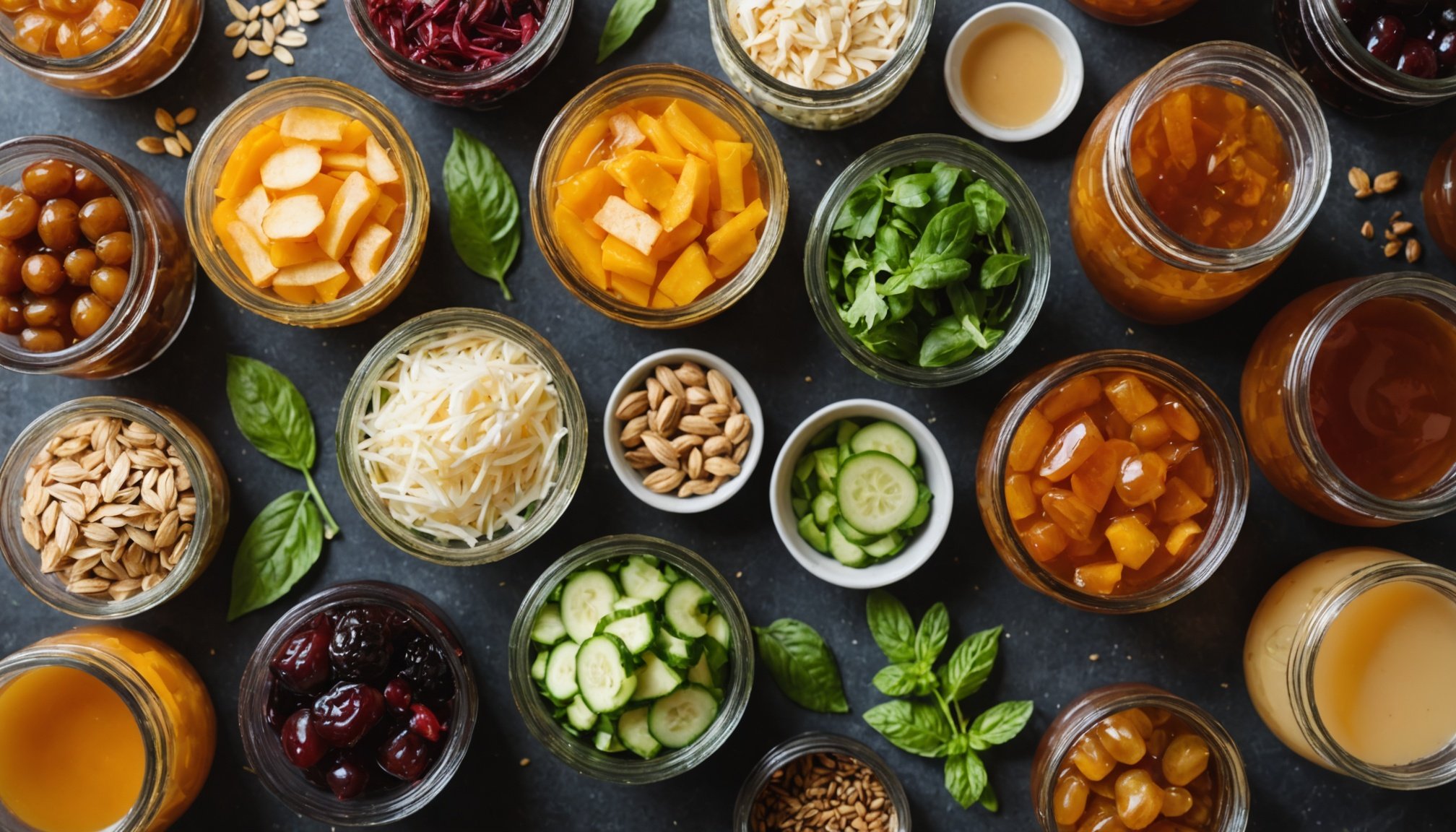Exploring the Impact of Fermented Foods on Mental Wellbeing: A Path to Better Mental Health?
Understanding the Gut-Brain Axis
The connection between our gut and brain, often referred to as the gut-brain axis, is a complex and fascinating area of research. This axis involves a bidirectional communication network between the central nervous system (including the brain) and the enteric nervous system (which governs the gastrointestinal tract). This communication is facilitated by the vagus nerve and involves the exchange of signals and substances produced by gut bacteria that can influence mood, behavior, memory, and cognition[3].
Katherine Brooking, a New York-based registered dietitian, explains, “Substances produced in the gut by bacteria can travel or send signals up large nerves, such as the vagus nerve, directly to the brain—triggering different brain activities that can alter mood, behavior, memory and cognition.”[3] This intricate relationship highlights the significant role that gut health plays in mental wellbeing.
In the same genre : Unlocking Focus: The Impact of Dietary Changes on ADHD Symptom Management
The Role of Fermented Foods in Gut Health
Fermented foods are rich in probiotics, which are beneficial bacteria that support gut health. These foods include yogurt, sauerkraut, kefir, and kombucha, among others. When consumed, these foods introduce live cultures of beneficial bacteria into the gut, enhancing the gut microbiome.
Health Benefits of Fermented Foods
- Improved Digestion: Fermented foods can improve digestion by increasing the efficiency of nutrient synthesis in the digestive system[5].
- Boosted Immune System: The probiotics in fermented foods help strengthen the immune system, reducing the risk of various illnesses[5].
- Better Mental Health: Research suggests that fermented foods can contribute to better mental health by supporting the gut-brain axis. For example, a study found that mice lacking gut bacteria showed worsening symptoms of depression and anxiety, indicating the potential role of gut health in mood regulation[3].
Impact on Mental Health
The impact of fermented foods on mental health is an area of growing interest and research.
Also read : Exploring the Impact of Peer Mentoring on Lowering Relapse Rates in Substance Abuse Recovery
Reducing Depressive Symptoms
Studies have shown that consuming fermented foods can have a positive effect on depressive symptoms. For instance, a study involving adults who consumed kefir daily for four weeks showed improvements in relational memory and an increased concentration of beneficial bacteria in the gut. This suggests that fermented foods may help in reducing symptoms of depression and anxiety[3].
Managing Stress and Anxiety
Gut bacteria play a crucial role in the body’s stress response. A recent study in mice found that the depletion of gut bacteria impaired the body’s stress response, highlighting the importance of gut health in managing stress. The bacterial species Limosilactobacillus reuteri was identified as a key player in this process, suggesting that maintaining a healthy gut microbiome could help in regulating stress responses[4].
Practical Tips for Incorporating Fermented Foods into Your Diet
Incorporating fermented foods into your diet can be simple and beneficial. Here are some practical tips:
Foods to Include
- Yogurt: Greek yogurt with honey is a great option. It promotes a healthy gut microbiome, supports neurotransmitter production, reduces inflammation, and provides essential nutrients for brain function[3].
- Sauerkraut: Add it to your meals or use it as a topping for hot dogs or salads.
- Kefir: Enjoy it by the glass or add it to overnight oats, smoothies, or creamy salad dressings[3].
- Kombucha: This fermented tea drink is rich in probiotics and can be a refreshing addition to your diet.
How Much to Consume
While there is no specific guideline on the daily intake of fermented foods, experts suggest including 2-3 servings a day in a balanced diet. However, it is important to note that too many fermented foods can cause gastrointestinal issues like gas and bloating[5].
Table: Benefits and Examples of Fermented Foods
| Fermented Food | Health Benefits | Examples of Use |
|---|---|---|
| Yogurt | Promotes healthy gut microbiome, supports neurotransmitter production, reduces inflammation[3] | Breakfast parfait, smoothies, marinating chicken, creamy dips |
| Sauerkraut | Improves digestion, boosts immune system, contributes to better mental health[5] | Hot dog topping, salads, side dishes |
| Kefir | Improves relational memory, increases beneficial bacteria in the gut[3] | Glass, overnight oats, smoothies, salad dressings |
| Kombucha | Rich in probiotics, aids in digestion and immune system[5] | Refreshing drink, added to salads or used as a base for smoothies |
| Kimchi | Anti-inflammatory properties, supports gut health[5] | Side dish, added to soups or stir-fries |
| Miso | Rich in probiotics, aids in digestion and immune system[5] | Soups, sauces, marinades |
Additional Strategies for Supporting Mental Health
While fermented foods are a valuable addition to a healthy diet, they are part of a broader strategy for supporting mental health.
Physical Activity
Regular physical activity is crucial for brain health. It increases blood flow to the brain, promotes the growth of new brain cells, and enhances cognitive function. Aim for at least 30 minutes of physical activity most days of the week[3].
Balanced Diet
A balanced diet rich in fiber and prebiotic foods like bananas, onions, and oats helps feed beneficial bacteria in the gut. A largely plant-based diet has been shown to have numerous health benefits and is recommended in the field of Nutritional Psychiatry[4].
Dietary Patterns
Incorporating a variety of dietary patterns that support gut health can be beneficial. Here are some key points:
- Fiber and Prebiotics: Include foods high in fiber and prebiotics to feed beneficial bacteria.
- Omega-3 Fatty Acids: These anti-inflammatory fatty acids, found in foods like salmon and walnuts, support brain health.
- Hydration: Adequate hydration is essential for overall health, including gut and brain function.
Expert Insights and Future Research
Experts in the field emphasize the importance of gut health in mental wellbeing. David Merrill, MD, PhD, advises, “We can support a healthy gut microbiome with dietary changes rich in fiber and prebiotic foods… For supplements, probiotics containing Lactobacillus or Bifidobacterium strains show promise to positively impact mood and stress responses by enhancing microbial diversity.”[4]
However, caution is warranted as more research is needed to fully understand the impact of specific diets and supplements on human mental health. Marc J. Tetel, PhD, notes, “Recognizing how the stress and circadian systems interact and are impacted by gut microbiota is critical to better understanding the role of these systems in a variety of mental health disorders, including anxiety and depression.”[4]
The connection between fermented foods, gut health, and mental wellbeing is a compelling area of research that offers promising avenues for improving mental health. By incorporating fermented foods into a balanced diet, staying active, and maintaining a healthy lifestyle, individuals can take proactive steps towards better mental health.
As Sharon Flynn, author of “Ferment for Good: Ancient Foods for the Modern Gut,” points out, “You’re more in danger of having poor health from not including these things in your diet than you are from including them.”[5] This advice underscores the importance of making informed dietary choices that support both gut and brain health.
In conclusion, while more research is needed to fully elucidate the mechanisms by which fermented foods impact mental health, the current evidence suggests that these foods can be a valuable component of a holistic approach to mental wellbeing. By embracing these foods and other healthy lifestyle practices, we can take significant steps towards improving our mental health and overall quality of life.
Personal Anecdotes and Case Studies
Exploring personal experiences and case studies can provide valuable insights into mental health improvement. Through these stories, we can better understand the real-world impact of lifestyle changes.
Real-Life Success Stories
Numerous individuals have shared inspiring narrative accounts of their journeys towards better mental health. One such case involves a young woman who struggled with anxiety. Through a combination of therapy and dietary adjustments, she noticed a marked reduction in her anxiety symptoms. By incorporating more omega-3 fatty acids and adopting a plant-based diet, her overall mental well-being improved significantly. Another account details a middle-aged man dealing with depression, who found relief by incorporating regular physical activity and a balanced diet focused on whole foods.
Common Themes in Experiences
Across various personal experiences, common threads emerge in the journey toward mental health improvement. A recurring theme is the importance of individualized approaches in dietary and lifestyle changes tailored to an individual’s specific needs. While some thrive on a vegetarian diet, others find balance through increased protein intake. Additionally, patterns observed include the prioritisation of nutrient-dense foods and adequate hydration. These commonalities highlight that mental health improvements are attainable through mindful lifestyle choices and personalized strategies.
Recipes and Tips for Fermented Foods
Embarking on a journey with fermented food recipes can be both exciting and rewarding. Whether you’re a seasoned fermenter or a novice, practical tips can significantly enhance your experience and the quality of your ferments.
For simple recipes, try making sauerkraut, one of the most approachable projects for beginners. You’ll need cabbage and salt—massage the cabbage until it releases enough liquid to cover itself when packed tightly in a jar. Lactobacillus bacteria naturally present on the cabbage will ferment it over a week, transforming it into tangy sauerkraut.
When purchasing store-bought fermented foods, always check labels for live and active cultures to ensure you’re benefiting from the probiotics. Avoid products with added sugars or preservatives as these can inhibit fermentation processes.
Dietary recommendations suggest incorporating fermented foods like kefir, kimchi, or miso into your meals regularly to boost gut health. If you’re following a specific diet, such as vegan or gluten-free, you’ll find many recipes that cater to these preferences, enabling you to enjoy the benefits of fermentation without compromising dietary needs. Remember, moderation is key to acclimating your body to these nutrient-rich foods.
Conclusion: The Future of Fermented Foods in Mental Health
The landscape of mental health and fermented foods is an exciting frontier, with ongoing studies shedding light on their potential impact. Despite promising results, there remain significant gaps in current research. Exploring these gaps is crucial for developing robust, evidence-based dietary recommendations.
Emerging trends in nutrition are gradually placing a stronger emphasis on mental wellbeing. Consumers and researchers alike are showing interest in understanding how fermented foods can contribute to emotional and cognitive health. As curiosity grows, so does the need for future research that rigorously examines these potential benefits.
In the coming years, potential developments may reshape dietary guidelines. By focusing on mental health interventions that incorporate fermented foods, there is a possibility to create more holistic approaches to wellbeing. With precise, targeted studies, these foods could become a staple in mental health regimes, promoting a balanced diet that supports both physical and mental health.
Furthermore, as dietary science advances, integrating these findings into public health recommendations would support individuals in making informed, health-conscious choices. Proactively bridging the gap between nutrition and mental health will contribute to a future where wellness is considered a comprehensive journey.
Understanding Mental Wellbeing and Diet
Mental health encompasses our emotional, psychological, and social well-being, significantly influencing how we think, feel, and act. It determines how we handle stress, relate to others, and make choices. Understanding mental health is crucial because it forms the foundation for an individual’s ability to lead a fulfilling life and participate actively in society.
Diet and psychology are deeply intertwined, with nutrition playing a pivotal role in mental well-being. A balanced diet provides essential nutrients that support brain functions. Nutrient deficiencies can negatively impact mood and cognitive functions, underscoring the connection between diet and mental health.
Research indicates that certain nutrients, like omega-3 fatty acids, have beneficial effects on emotional wellbeing. Consuming these nutrients can improve mood stability and reduce symptoms of depression. Hence, being mindful of dietary choices can be an effective strategy for boosting psychological outcomes.
Additionally, complex carbohydrates, lean proteins, and colourful produce have been shown to support optimal brain health. Hence, integrating these foods into one’s diet can positively impact one’s overall mental health. Prioritising nutrition is not merely about maintaining physical health but equally about supporting emotional wellbeing.
The Science Behind Fermented Foods and Mental Health
Fermented foods, rich in probiotics, have become central to discussions about dietary impacts on mental health. These foods, including yogurt, kimchi, and sauerkraut, are made through microbial activity which enhances their nutrient profile.
A critical concept here is the gut-brain axis. This bi-directional communication network links our digestive processes with the nervous system, influencing numerous aspects of our mental state and behaviour. It’s thought that the microbiome, a collection of microorganisms in our gut, plays a key role in this interaction. By modulating the microbiome, fermented foods can potentially influence this axis.
Scientific studies have explored these connections, providing intriguing insights. Research indicates that consuming fermented foods might reduce symptoms of anxiety and depression, by fostering a positive gut environment that enhances neurotransmitter function. Such findings underscore the microbiome’s potential to impact mental health through dietary choices.
In summary, the relationship between fermented foods and the gut-brain axis highlights the potential for diet to affect mental wellbeing. While more research is necessary, the initial evidence supporting the mental health benefits of fermented foods is promising and paves the way for future exploration into dietary mental health interventions.
Mechanisms of Action
The link between probiotics and mental health is a burgeoning area of scientific inquiry. Probiotics from fermented foods can significantly influence the gut microbiome, which plays a crucial role in maintaining health. These beneficial bacteria help balance the gut ecosystem and, as such, aid in the production of neurotransmitters. Neurotransmitters like serotonin are vital in mood regulation and overall mental well-being.
Neurotransmitters originate from biosynthetic pathways heavily reliant on nutrients produced or modified by gut bacteria. For instance, tryptophan, a precursor to serotonin, is influenced by gut flora. Thus, the consumption of probiotics could potentially lead to elevated serotonin levels, thereby improving mood regulation.
Another key aspect is the impact of inflammation on mental health. Chronic low-grade inflammation has been linked to mood disorders such as depression and anxiety. Diets rich in probiotics help reduce inflammation markers, suggesting a beneficial approach to managing inflammatory processes. By modulating the immune response, probiotics may play a pivotal role in reducing inflammation-induced mood disturbances, making a probiotic-rich diet a promising intervention for those struggling with mental health challenges.
Understanding these interactions highlights the importance of dietary considerations in mental health strategies.
Key Research Findings
Exploring the relationship between fermented foods and mental health, recent clinical studies provide compelling evidence of potential benefits. These studies often emphasize how these foods could positively influence mental well-being. For instance, research has identified a correlation between the intake of these foods and a reduction in symptoms of anxiety and depression.
Meta-analyses and systematic reviews provide a comprehensive research review, assessing various studies and highlighting the consistent observation of positive mental health outcomes. These reviews underline the importance of fermented foods’ impact on gut microbiota, which plays a critical role in mental health.
Diverse mental health outcomes observed include improved mood regulation and enhanced cognitive function. This underscores the complexity of the mind-gut connection and the broader implications for mental health strategies. As our understanding deepens, it continues to open avenues for future clinical studies aimed at optimizing mental health through dietary interventions.
Consistently, these findings encourage individuals to consider integrating fermented foods into their diets as a natural and accessible approach to support mental health. Further systematic reviews will be crucial in refining guidelines and ensuring practical applications for the broader population.
Practical Tips for Incorporating Fermented Foods
Adding fermented foods to your diet can enhance gut health and boost your immune system. Popular choices include yogurt, kimchi, kefir, sauerkraut, kombucha, and miso. These foods are not only rich in probiotics but also offer unique flavours to your meals.
For seamless incorporation, consider meal planning. Start your day with a yogurt parfait topped with berries, or enjoy a side of sauerkraut with your sandwich at lunch. Kimchi can be a spicy addition to your dinner, complementing many protein dishes. For snacks, try sipping on kombucha or mixing some kefir with fresh fruit in a smoothie.
If you have dietary restrictions, some fermented foods can still be suitable. For instance, those avoiding dairy can opt for miso or sauerkraut, which are vegan-friendly. Gluten-sensitive individuals might benefit from gluten-free tamari instead of soy sauce.
By considering these options, you can create a well-rounded meal plan that accommodates your dietary needs without missing out on the unique benefits fermented foods offer. Tailor your choices to fit your lifestyle for a nutritionally enhanced diet.
Expert Opinions and Anecdotes
Gain valuable insights from health professionals about the benefits and limitations of fermented foods. Nutritionists often highlight lactobacilli and other probiotics found in these foods as supportive of gut health. Mental health professionals suggest that a healthy gut can positively influence mood and cognitive function, offering a holistic wellness approach. Such discussions underscore the multifaceted benefits while acknowledging that effects can vary based on individual health profiles and dietary needs.
Personal stories provide tangible evidence of the beneficial impact of fermented foods. Take, for example, a case study of an individual who introduced kefir and sauerkraut into their diet, reporting improved digestion and energy levels. These anecdotes serve to illustrate real-world applications and experiences, revealing the practical outcomes of incorporating fermented foods into daily routines.
While testimonials often reveal positive impacts, they also reflect diverse experiences. Some individuals, for instance, encounter mild digestive discomfort initially, which stresses the importance of gradual introduction. These testimonials and varied perspectives contribute to a balanced understanding of how fermented foods interact differently across personal contexts, underscoring the need for tailored dietary plans guided by professional advice.
Conclusion and Future Considerations
The landscape of nutritional psychiatry is expanding, with a growing body of ongoing research unveiling intriguing connections between fermented foods and mental health. These studies are exploring the potential for fermented foods to impact conditions such as depression and anxiety, offering promising insights into the future implications for mental well-being.
One emerging area involves understanding how the gut microbiome, influenced by dietary choices, plays a role in regulating mood and cognitive function. As researchers delve deeper, nutritional psychiatry may begin to incorporate these findings, highlighting food as a viable component of mental health care.
For individuals and practitioners interested in harnessing these insights, it’s essential to stay informed about validated research findings. Doing so ensures integration into diets safely and effectively. This progressive approach could reshape traditional psychiatric paradigms, offering considerations for personalized mental health strategies.
While the field is still in its infancy, the future looks bright. As nutritional psychiatry evolves, it may reveal novel dietary frameworks aimed at optimizing mental health, underscoring the profound role that food may play in our emotional and psychological landscapes. As habitual and dietary shifts occur, a new era for mental wellness may soon be upon us.











